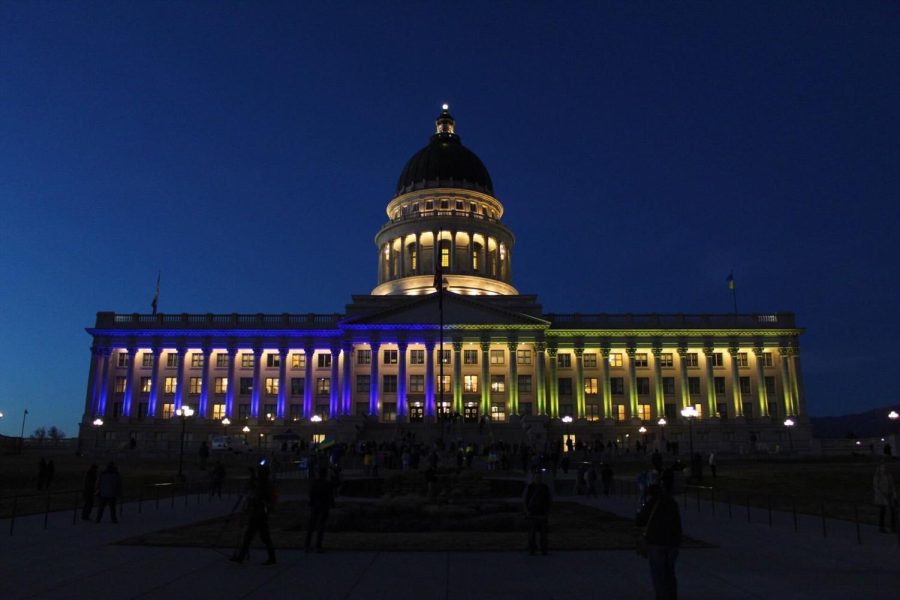Alexander: The Racist Double Standard of the Ukraine-Russia Conflict
The Utah State Capitol lit up in the colors of the Ukraine flag on Feb. 28, 2022. (Photo by Carlene Coombs | The Daily Utah Chronicle)
March 22, 2022
The Ukraine conflict has forced us to confront numerous issues and, surprisingly, racism is among them. In covering the devastating invasion, many journalists have taken a compassionate stance for Ukrainians while being hostile and indifferent to people of color experiencing similar events. There have been conflicts for years in areas like Syria, Palestine, Honduras and more. But there’s a clear preference for who the media wants to sympathize with and who they want to dehumanize. The media’s coverage of the Ukrainian conflict demonstrates a significant racial bias in how we treat refugees and immigrants of color in war conflicts.
Several news anchors, journalists and high-profile people have expressed their surprise at violence in Ukraine by comparing it to the Middle East. Charlie D’Agata, CBS News’ senior foreign correspondent, said on-air that Ukraine isn’t the place to expect raging conflict, and that unlike Iraq or Afghanistan, Kyiv is a city that’s “relatively civilized, relatively European.” Lucy Watson, for ITV News, noted that Ukraine “is not a developing, third world nation; this is Europe.” Another French commentator exclaimed, “we are in a European city and we have cruise missile fire as though we were in Iraq or Afghanistan.” Even Prince William, the Duke of Cambridge in Britain, claimed that it was “alien” to see war in Europe, despite his own family’s involvement in war historically.
Comments and language like this reinforce the idea that countries and regions with people of color are inherently prone to violence. This ultimately dehumanizes communities of color in saying they’re used to living in areas of violence, war and terror.
Besides comparing the Middle East to Ukraine, the racist double standard rears its ugly head in other ways. In regards to the refugee response, Ukrainian refugees have experienced no shortage of help. Celebrities continue to raise money and work towards the Ukrainian effort, and people are booking Airbnbs for refugees to seek shelter. But noticeably, people treat Ukrainian refugeeism much differently than the trauma of refugees and immigrants of color also leaving war-torn countries.
For example, a French politician claimed that Ukrainian refugees represent “high-quality immigration.” The Bulgarian Prime Minister stated they are “intelligent and educated … this is not the refugee wave we have been used to, people we were not sure about their identity, people with unclear pasts, who could have been even terrorists.” There’s even a difference in how we treat the children of such crises. Ukrainian children’s stories are amplified in the Washington Post, while Latin American kids crossing the United States border are put in cages.
Our reactions and responses matter. When it comes down to sympathizing and helping people in need, we should focus on humanity, not color. The indifference we show immigrants of color versus Ukrainian immigrants illustrates the very epitome of racism: we care about the people who look like us, and ignore the ones that don’t.
While a lot of the media discourages me in the Ukraine conflict, there’s still hope. Surprisingly, Utah has become a model in demonstrating how to not discriminate in times of conflict. In the past, federal officials placed refugee/immigrant bans on certain countries, specifically countries with majority-Muslim and POC populations. These bans were racist, Islamophobic and reinforced the falsehood that Muslims are a dangerous group of people. But the decision accurately captures how the U.S. operates in sympathizing with people of color.
Luckily, things are different in Utah. In 2021, when U.S. troops left Afghanistan after 20 years, Gov. Spencer Cox tweeted that Utah “stands ready to welcome” Afghan refugees. This move demonstrated Utah’s empathy for people fleeing horrible situations, regardless of color. And it makes sense, considering how Utah has always been a hub for immigrants of all backgrounds. With nearly one in 11 Utahns having been born in another country, the refugee response and efforts here are effective and far-reaching.
As for the Ukrainian conflict, Utah has also taken a compassionate stance and offered their support to Ukraine and the Ukrainian people fighting for freedom. In doing so, Utah provides an example as to how to actually receive and talk about immigrants, something the rest of the U.S. and even European countries can stand to learn.
Some might say that the media coverage, comments and attention to the Ukrainian conflict has nothing to do with race and more to do with its spontaneity. But the empathetic type of media coverage utilized now was never present for Yemen, Nigeria and Venezuela. Even in Afghanistan and Iraq, we weren’t nearly as sympathetic as we should have been. Our lack of compassion for the people living there — people of color — reveals that we think they’re simply used to war, and not worth sympathizing with. By covering these conflicts and people differently, we are choosing to uphold the discrimination and dehumanization of communities of color.
I do hope the Ukrainian conflict ends soon. My heart goes out to all the Ukrainians fighting and trying to survive against the invasion. But at some point, we have to ask ourselves what values we uphold when we paint communities of color as less deserving of sympathy.








